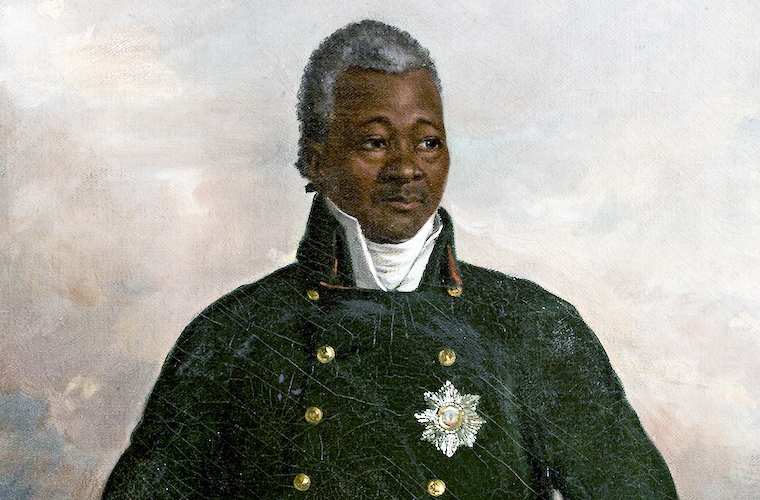Henry Christophe learned everything he knew from experience. A Negro born into a slave family on the island of Grenada, he never went to school and was illiterate his whole life. His life’s purpose was to eradicate slavery and build Haiti into a strong country, and the slave boy who would be king took seriously the power and perks that came with the job.
Christophe was a rambunctious kid. At age seven the plantation owner turned his unchanneled energy into profit when he sold the boy to a Negro mason as an apprentice. Christophe ran away from his master and stowed away on a boat bound for the island of Saint Domingue (now Haiti). At age twelve, Christophe ended up the servant of a French naval officer, hired to oil his boots and serve his meals. This job took him north to America where Christophe fought with the French in the Siege of Savannah before returning to Haiti where he was again sold to a free Negro who owned a hotel. The ambitious young man moved up from a stable boy to a cook, waiter, and billiard marker. He saved enough money to buy his freedom.
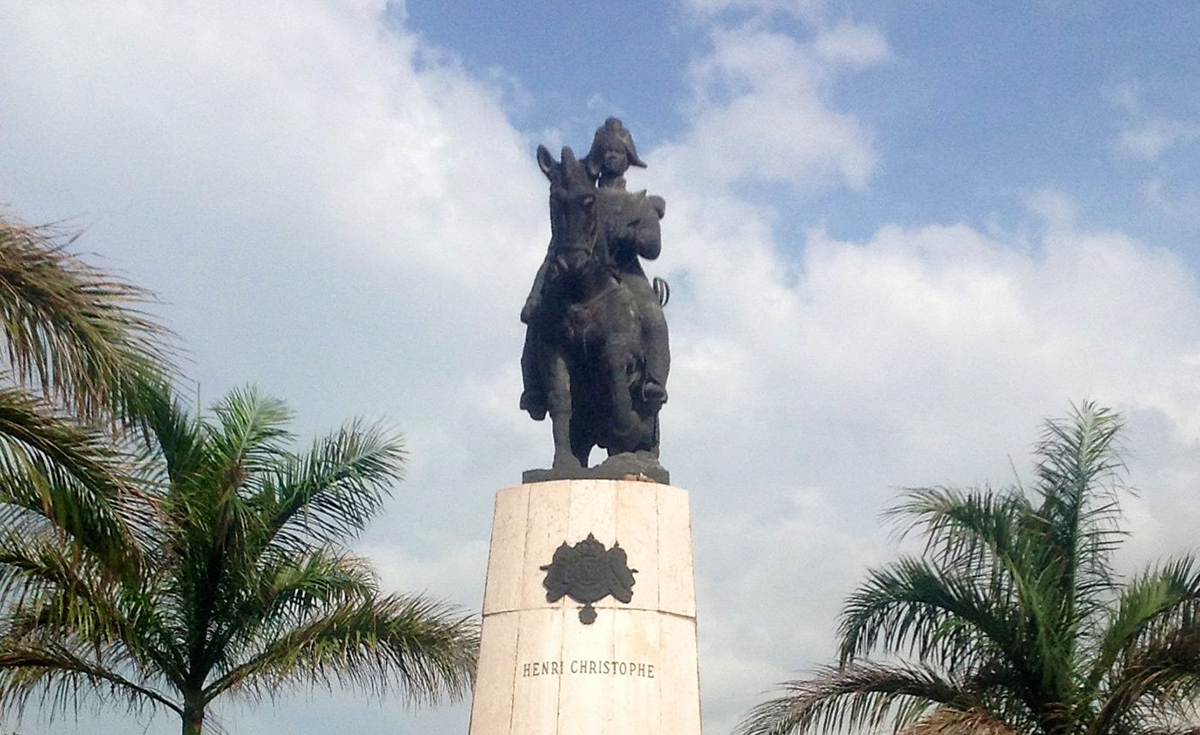
When Christophe was 26 years old he married the boss’s daughter, Marie Louise, who was only 15. They had two sons and two daughters.
The Spanish, French, and English all had interests in the island, and the slaves were rebelling for their freedom. Black General Toussaint Louverture led the army to claim their emancipation. Christophe volunteered to fight with Toussaint and showed early leadership skills. Seven years later, Toussaint, had driven the Spanish back to their side of the island and defeated the British. He designated himself the Governor-General and appointed a trio of successors: Christophe as general and military governor, Jean-Jacques Dessalines as a provincial governor, and Alexandre Sabès Pétion (a mulatto), who ended up in the south. Toussaint, seeing an opportunity for independence, set up a government without asking permission of Napoleon Bonaparte, which prompted Napoleon to send an expedition to the island to reestablish French dominion.
The captain of the French expedition was Charles LeClerc, and he insisted on negotiating directly with Toussaint. While LeClerc waited on the ship, his emissary went ashore and was insulted when he was met by the second in command, Christophe. Thinking a black, former slave could be easily persuaded, LeClerc offered Christophe many honors if he would turn over the town of Cap François before Toussaint arrived. Christophe was insulted by the insinuation that he would betray his commander. And, there was the underlying fear that one objective of the French mission was to reinstate slavery.
The messenger delivered Christophe’s message to his boss, and Christophe vowed to his commander and his countrymen that if LeClerc came ashore, there would not be any town for him to claim because Christophe would personally see to it that it would be burned. LeClerc sent Christophe a letter warning that 15,000 soldiers would disembark at dawn if Christophe did not capitulate. Christophe’s response reiterated his loyalty to the chain of command. Since he was illiterate, the content of his letter was dictated, but Christophe was able to sign his name.
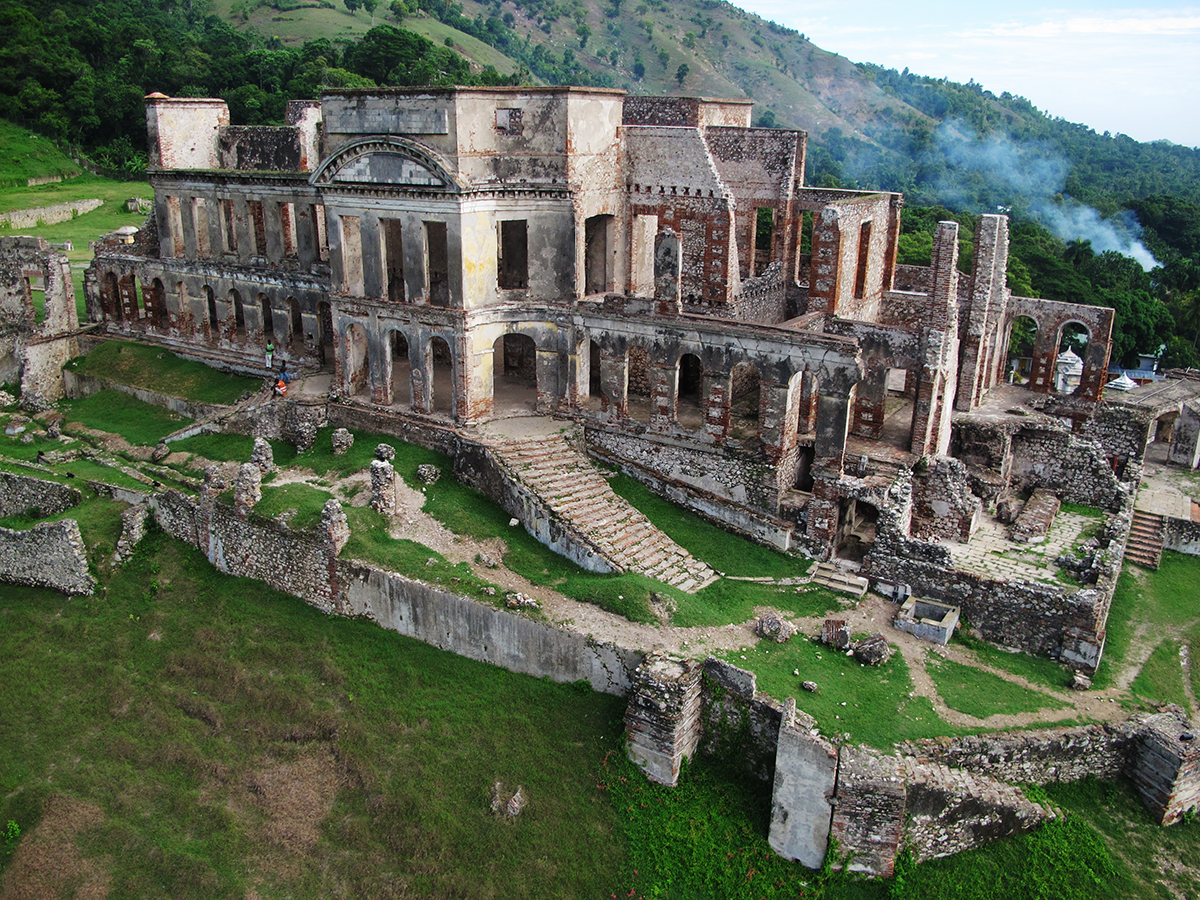
After one more written attempt to resolve the situation, LeClerc made good on his threat, and Christophe made good on his promise. Despite the pleas of the townspeople of Cap François not to destroy their homes, while the French soldiers stormed the shore, Christophe torched the city, starting with his own house.
Now Haiti was at war with France, and eventually, the Haitians were overwhelmed by the French. Christophe, on behalf of Toussaint, was willing to negotiate. The sticking point was slavery, and LeClerc, speaking for Napoleon, agreed to let every person be free. Finally, an agreement was reached with the stipulation that Toussaint retires to his plantation. He did so, but LeClerc had reason to believe that he was planning another uprising, so Toussaint was arrested and exiled to France with his family.
When LeClerc died of yellow fever, the black and mulatto leaders agreed to submit to the command of Jean-Jacques Dessalines who led them to freedom. On January 1, 1804, they declared independence and Saint Domingue officially became Haiti.
The mulattos in the south did not accept being ruled by blacks. They rebelled and assassinated Dessalines. A national assembly was quickly organized to elect the next leader, and it was between Christophe and Pétion. In a gesture of reconciliation, Christophe, age 40, was elected, if somewhat grudgingly, as President of Haiti for four years, residing in the north.
Christophe took his authority seriously and declared Catholicism as the official religion, although other beliefs would be tolerated. He made divorce illegal, and parents were not allowed to disinherit their children. He understood the importance of trade, and he courted the United States and Britain as trading partners, giving foreign businesses absolute protection.
Haiti had no currency, so Christophe created one. Gourds were used for bowls, utensils, and bottles, making them indispensable to daily life, but they wore out. The new president confiscated all the gourd plants. When the farmers brought dried coffee berries to the capital, Christophe would buy them, paying in gourds. Then he sold the coffee to other countries for gold, giving Haiti a growing, stable currency. Even today, the term for Haiti’s money is the gourde.
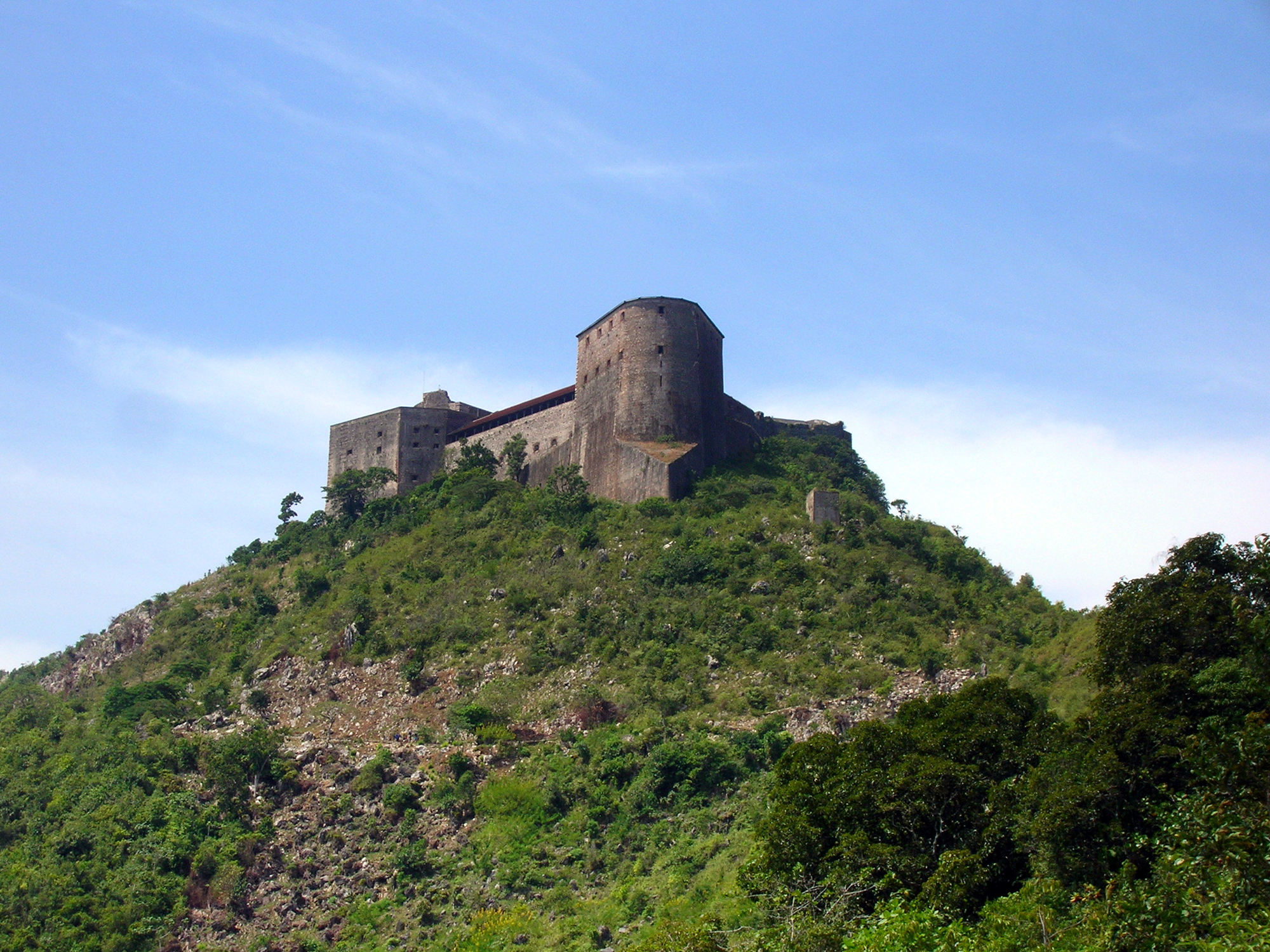
Pétion didn’t accept Christophe as President, and he set up his own government in Port-au-Prince, instigating a civil war. Both men stubbornly held on to their respective territories, and it seemed inevitable to tacitly accept that unifying Haiti would not be possible. In February 1807, Christophe was elected the President of the State of Haiti, giving him jurisdiction over the north and making him the generalissimo of the forces on land and sea for life. His capital was Cap François. One month later, Pétion was elected the President of the Republic of Haiti for four years with his capital at Port-au-Prince in the south. He was later elected to a second four-year term.
Christophe was more ambitious than Pétion, and his efforts built up his infrastructure and defense, and his reputation overseas. He accumulated a fleet of ships and started a navy that controlled the local waters. For all his success, the threat of a French invasion never diminished. Christophe’s advisors thought that having a ruler of equal rank to the emperor Napoleon would be more effective in staving off any aggression. They respectfully suggested that Christophe be declared king, and it didn’t take much convincing to get him to go along with the idea. He became Henry I, preferring the English spelling, and changed the name of the capital to Cap Henry. The coronation was on June 2, 1811, in a cathedral that was built for the occasion in about two months.
He was officially crowned “Henry, by the Grace of God and the Constitutional Law of the State, King of Haiti, Sovereign of Tortuga, Gonave and other adjacent Islands, Destroyer of Tyranny, Regenerator and Benefactor of the Haitian Nation, Creator of her Moral, Political and Martial Institutions, First Crowned Monarch of the New World, Defender of the Faith, Founder of the Royal and Military Order of Saint-Henry,” just in case there was any doubt about his authority.
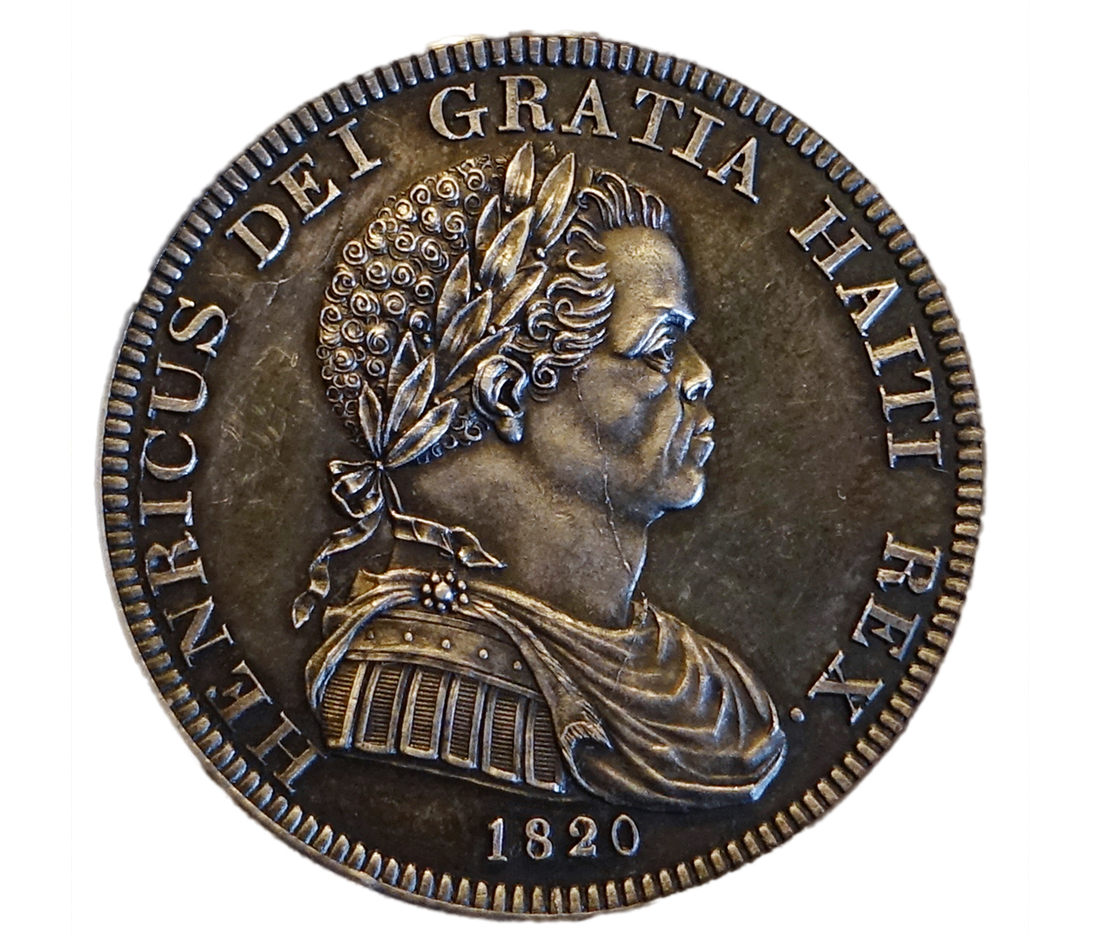
The new king created a hereditary nobility and spiritual hierarchy with a Catholic archbishop in the capital and bishops in other cities. He instituted a strict dress code for the nobility and an Order of Chivalry whose members wore a large cross embedded with jewels.
Under Christophe’s leadership, his colony began to thrive. He introduced Code Henry mandating that every adult was obligated to work in the fields. Monday through Friday they were required to work from daylight until 8:00 am when they took a break for breakfast. Then they worked from 9:00 until 12:00 when they got a two-hour rest. They resumed working at 2:00 until dusk. Saturday was a day off from the fields to allow the workers to tend to their own land and take their goods to market. Sunday was reserved for rest and going to church. The plantation owners had to give one-quarter of their gross profits to their workers and provide room and board and medical treatment. An owner could not transfer a worker from one activity to another without the worker’s permission. The military police oversaw the plantation owners to insure compliance.
The king availed himself every Thursday for a public audience when he would listen to petitions. In the morning he received the commoners, and in the evening he received the aristocracy, who were required to wear their military uniform or formal court dress. An answer was always given the following Thursday. Christophe had his hands in everything. He monopolized the meat supply and all the cattle crazed on state land. He built seven palaces and 15 chateaux, all surrounded by fertile land which produced, among other things, two-thirds of the kingdom’s sugar export. He sold everything for gold, increasing his personal wealth and the national treasury.
Even though he hated the French, he knew the country needed the expertise and knowledge of white men. He offered full citizenship to any white man who married a Haitian woman and lived in Haiti for one year. Any white man who married a black woman anywhere in the world would be welcomed to settle in Haiti, and the government would set them up.
The future of the kingdom was very important to the king, and Christophe created five national schools for boys modeled after Joseph Lancaster’s British and Foreign School Society. Teachers were quickly trained for two thousand students. English was required, and advanced students could learn Spanish. The curriculum also included French, reading, writing, arithmetic, and grammar. During the summer, classes met from 6:00 am to 11:00 am and then again from 2:00 to 6:00. The winter hours were shorter, from 7:00 in the morning until 5:00. Thursday and Sunday were days off with the exception of attending morning prayers and a lecture. In addition, every boy at least ten years old had to learn a trade.
Upon the recommendation of the monarch’s personal physician, Dr. Duncan Stewart, a Scottish surgeon who visited many of the commoners working on the king’s farms, it was necessary to educate girls in order to prevent voodoo from creeping back into public practice. In 1818 Christophe issued an edict opening up education for girls but stipulating that they must be taught in schools separate from boys. Christophe also founded a royal college for secondary education where students studied English, French, Latin, history, geography, and math.
Public health was also an issue the king focused on. He appointed Dr. Stewart as director of the hospital with responsibility for the accommodations for the sick. In addition to food and clothing, this included a pair of stocks installed at the foot of each bed for the legs of the patient if he was disobedient or didn’t take his medication.
The British didn’t fully recognize Christophe’s authority, but that did not inhibit him from imposing it absolutely on his citizens. Every marriage had to be a civil contract, and as the king moved around the kingdom if he even suspected that a couple was living in sin, he forced them to marry on the spot. The penalty for stealing was death, and those guilty of a misdemeanor were punished by flogging. Christophe carried a silver-topped cane and used it to beat people he saw on his daily walks who he deemed were being lazy. No one was immune from the king’s judgment. One time he went to mass and the priest was not immediately there. Christophe ordered soldiers to arrest him and take him directly to jail.
Being a dictatorial monarch took its toll on Christophe. On August 15, 1820, during the mid-day break, he went to mass, which was not a part of his normal routine. Just before he was given communion, Christophe suffered a stroke which left him permanently paralyzed. His mind was still clear and he tried to carry on business as usual, but his government was threatened by factions who hated his tyrannical ways. In October the king tried to stand up to the rebels, but he realized he did not have the support he needed.
One Sunday evening, Christophe called his wife and children into his room to discuss the state of the state and sent them off to bed. After they left he raised a pistol to his chest and shot himself. As word of the king’s death got out, looters started ransacking the palace. Two men were able to get the body out of the residence, but they couldn’t find tools to dig a grave, so they buried Christophe in a pile of lime. In 1847, 27 years after his death, the monarch who did great things for his country, if perhaps not in great ways, was given a proper burial in a concrete tomb at the place d’Armes at the Citadel on the peak of La Ferrière.

